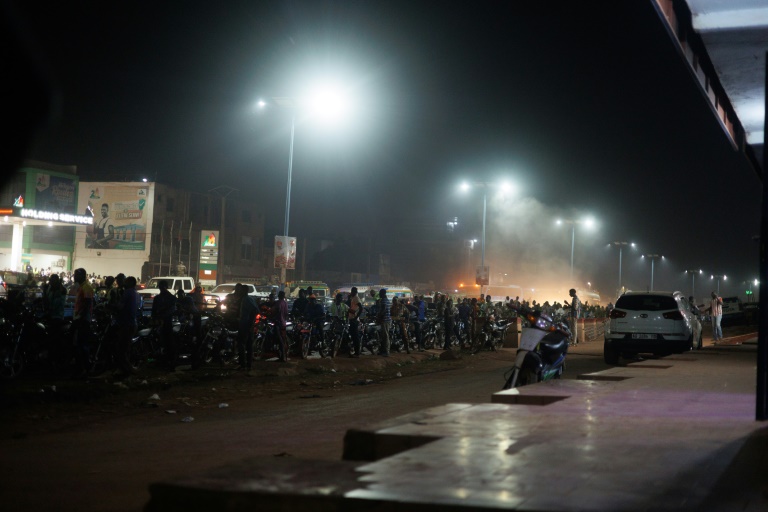World
Fuel Blockade Paralyzes Daily Life in Bamako Amid Jihadist Attacks

In Bamako, the capital of Mali, a fuel blockade imposed by jihadist groups has severely disrupted daily life. Hundreds of vehicles remain stranded on major roads, as residents struggle to access essential fuel supplies. The blockade, which has persisted for weeks, has been attributed to the Group for the Support of Islam and Muslims (JNIM), linked to Al-Qaeda, which has intensified its operations in the region.
Karim Coulibaly, a bus driver in his 30s, shared his frustration, saying, “I’ve been here for three days. I’ve spent two nights here,” emphasizing how the lack of fuel has left him effectively unemployed. Fuel shortages have escalated to a point where only one tanker arrived at the local petrol stations over a three-day period, and it was depleted within an hour. The situation has prompted authorities to impose fuel rationing, with prices soaring to 10,000 CFA ($17.75) for just 13 liters.
The blockade has crippled the capital’s economy, particularly following back-to-back military coups in 2020 and 2021. Since then, the military junta has grappled with a surge in violence from armed groups, particularly JNIM, which has been targeting fuel tankers traveling from Senegal and Ivory Coast. The blockade is a direct retaliation against the junta’s ban on the sale of fuel outside designated service stations in rural areas, aimed at cutting off supply lines to jihadists.
Impact on Daily Life and Economy
The blockade’s effects have cascaded through Bamako, with many residents facing hardships. Oumar Diallo, a civil servant, remarked, “I haven’t gone to work for a week,” while waiting in a long queue for fuel. The dire situation has prompted the U.S. embassy in Mali to advise American citizens to “depart immediately” due to the unpredictable security conditions in the capital.
This fuel shortage is exacerbating existing power issues in Mali, where residents have long dealt with intermittent electricity supply. The electricity provider, Energie du Mali (EDM), has reduced service from 19 hours to just six hours daily. Mamadou Coulibaly, an electrician, described the impact on his work, noting he has been unable to communicate due to lack of power to charge his phone and power banks.
In response to the fuel crisis, schools and universities have been closed for two weeks, as announced by the junta. This disruption comes at a critical time, as the nation is in the middle of its harvest season. Ousmane Dao, a grain vendor, pointed out that typically, prices for rice and millet drop during this time, but this year, the opposite is occurring due to fuel shortages affecting agricultural machinery.
Adaptation and Resilience
As the situation worsens, Bamako residents are seeking alternative solutions. Those with financial means are installing solar panels to generate electricity for their homes and businesses. A representative from EDM, speaking anonymously, highlighted that “everyone who can afford it has installed solar panels,” indicating a shift towards self-sufficiency amid widespread shortages.
Younger residents, like mechanic Chaka Doumbia, have resorted to creative improvisation. He shared his method of mixing paint solvent with alcohol to power engines, a risky endeavor that can lead to dangerous outcomes if not properly measured.
Food supplies are dwindling in grocery stores across the city. Hamidou Maiga, a local shopkeeper, mentioned, “We’re starting to run out of spaghetti, macaroni and yogurt, even though they’re made here,” attributing the shortages to the lack of electricity hampering production.
The junta has yet to comment on the unfolding crisis, leaving residents grappling with daily survival amidst an escalating humanitarian situation. The fuel blockade represents not just a logistical challenge but a profound disruption to the social and economic fabric of Bamako, where the struggle for basic necessities continues to intensify.
-

 Science3 months ago
Science3 months agoToyoake City Proposes Daily Two-Hour Smartphone Use Limit
-

 Top Stories3 months ago
Top Stories3 months agoPedestrian Fatally Injured in Esquimalt Collision on August 14
-

 Health3 months ago
Health3 months agoB.C. Review Reveals Urgent Need for Rare-Disease Drug Reforms
-

 Technology3 months ago
Technology3 months agoDark Adventure Game “Bye Sweet Carole” Set for October Release
-

 World3 months ago
World3 months agoJimmy Lai’s Defense Challenges Charges Under National Security Law
-

 Lifestyle3 months ago
Lifestyle3 months agoVictoria’s Pop-Up Shop Shines Light on B.C.’s Wolf Cull
-

 Technology3 months ago
Technology3 months agoKonami Revives Iconic Metal Gear Solid Delta Ahead of Release
-

 Technology3 months ago
Technology3 months agoApple Expands Self-Service Repair Program to Canada
-

 Technology3 months ago
Technology3 months agoSnapmaker U1 Color 3D Printer Redefines Speed and Sustainability
-

 Technology3 months ago
Technology3 months agoAION Folding Knife: Redefining EDC Design with Premium Materials
-

 Business3 months ago
Business3 months agoGordon Murray Automotive Unveils S1 LM and Le Mans GTR at Monterey
-

 Technology3 months ago
Technology3 months agoSolve Today’s Wordle Challenge: Hints and Answer for August 19









